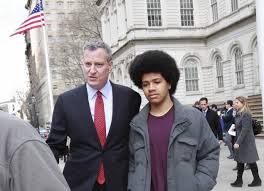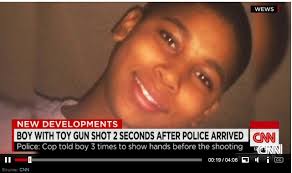Breaking: Water is Still Wet

Late last year, the NY Police were very, very cross with their new Mayor, who had the gall to mention that he had instructed his son to be very careful and respectful if he had any encounters with the police. Here’s a picture of the mayor and his son.
What possible reason could da mayor have had for saying such a thing?
(Excuse my insolence. I forgot we live in the post-racial America now.)
In response, the police union announced a virtual work stoppage during which they would not issue citations or make arrests “unless absolutely necessary”. Arrests fell by 66%, parking citations by 94%, and traffic tickets by 94%, according to the NY Post. My favorite stat:
“Summonses for low-level offenses like public drinking and urination also plunged 94 percent—from 4,831 to 300.
Of course, everyone remembers all the headlines about how NYC became a flame-engulfed hellscape in which drunken parking scofflaws urinated all over unsuspecting touristas. Snake Pliskin himself would have fled in horror, amirite?
Alas, no.
There was no surge in crime. The city went on as before. It turns out all that hyper-vigilant enforcement activity was not the only thing standing between Gotham and Somali-esque chaos. It turns out that most of the police work was not, to borrow from the union’s statement, “absolutely necessary”. Who knew?
The ‘broken windows’ policing philosophy that became (in)famous under NYPD in the 80s-90s became a tool for harrassment of minorities and other “suspicious” characters. In tandem with the lunatic war on drugs frenzy, this was really nothing more than a cudgel to keep Those PeopleTM in line. Stop-and-frisk statistics clearly demonstrate the disproportionate burden imposed on minorities through its practice. Even after research demonstrated that the tactic had little real effect on wider crime rates, most police forces insisted that this was the only way to keep the streets safe for our law-abiding citizens.<fn>Who, it turns out, are bad for budget solvency!</fn> But America loves it some authoritarianism, and so long as the burden is borne by Those PeopleTM, Johnny Law had no reason to change.<fn>FWIW, I have little patience with the smart-ass ‘No cops? No crime!’ tautology of the gLibertarian crowd. Many – maybe even most – police officers are decent people trying to do a difficult, often dangerous. Though statistically speaking, the chance of death or injury on the job is greater for about two dozen other careers, e.g. fishing, logging, or collecting trash.</fn>
Last week, our local fishwrap reported that the Leon County budget is facing a million dollar hole “because of a decline in the number of traffic tickets being written by the Tallahassee Police Department over the past 18 months.” Shortly after TPD settled an excessive force lawsuit <fn>Half a million bucks, taxpayers!</fn>, the chief of police “… went to the patrol division and instructed officers to continue writing traffic citations for serious offenses, but gave them the option and encouraged discretion in issuing warnings for stops for minor offenses.”
The article goes on to talk about TPD shifting it’s emphasis to a law-enforcement model that encourages engagement over confrontation. A TPD spokesman offered this:
“Our policing in Tallahassee has changed. In the past we may have been doing a traffic stop, and immediately the idea would be to write as many tickets as would warrant. Now the process is more of an education over enforcement at times.”
The result? TPD wrote fewer than half the number of tickets compared to the prior year. That number had been pretty steady for years. Perhaps some of that hard-core Barney Fifeing was not “absolutely necessary”? Maybe that instinct to “write as many tickets as would warrant” led to some, oh, let’s call it overly creative police work.
The news that the city government in Ferguson, MO, viewed its citizenry as little more than a dusky-hued ATM has spread far and wide.<fn>As long as far and wide does not include that place where certain friends and relations think everything would be fine of Those PeopleTM would just simmer down a little and know their place.</fn> Ta-Nehisi Coates provides a rundown on the situation in The Atlantic, and there is really little I can add to his excellent work.<fn>Why this guy does not have a twice-weekly slot on the NYT editorial page is an ongoing mystery.</fn> Notably, the federal DOJ reported that the department held contests to see who could write the most tickets for a single offense<fn>Merely a motivational tool to ensure greater public safety, no doubt.</fn> and that the city manager actively encouraged the police to step up citations when revenue began to lag. Suffice to say that there has been an ongoing and conscious effort to balance the city budget on the backs of the (mostly) Black citizens who can least afford it.<fn>That the collection agency is the predominately white police force is certainly just an unfortunate coincidence that makes this situation appear racial despite the fact that we have arrived at an utterly color-blind and post-racial period of harmony and unicorns. Pardon my insolence.</fn>
(By the way, I am not accusing Tallahassee police of this same racially-structured revenue enhancement, but I am curious to see the statistics one way or the other. However that turns out, I have not noticed our little burg devolving into any sort of Mad Max-ish dystopia in the absence of hyper-vigilant policing.)
I’m no public policy expert, but it seems pretty clear that if eliminating “unnecessary” citations and fines creates a hole in the budget, that money is going to have to come from some other source. <fn>But that leads us to the word that must never be spoken: taxes. Yet another legacy of St Ronald the Dim: we can have everything we want without paying taxes. It’s magic!</fn> “Enhancing” revenues through law enforcement is just another creative means of making up the shortfall that was, at one time, borne by the community as a whole. It essentially makes criminal activity a necessary component of a healthy city budget.
What would happen if, miraculously, our entire population became perfectly docile, law abiding citizens, as in Singapore, where the idea of a stray gum wrapper or jaywalking is unthinkable? If we are relying upon revenue from citations to balance the budget, we would have two choices: raise revenues some other way or create criminal activity where we can impose fines. (Are we headed to a day when people who do not commit infractions are labeled “takers” because they refuse to pay their fair share; at that point, the police will be viewed as “makers”.<fn>I kid! Such Randroid stupidity could never happen here.</fn>) Couple this impulse with the distortion already created by militarizing the police and inculcating an occupation force mindset<fn>cf.  </fn> – alongside the budget-balancing incentive to confiscate property under drug laws run amok – and the inevitability of our descent into police state-ism is apparent.<fn>Has that ship sailed? Is it too late?</fn>
</fn> – alongside the budget-balancing incentive to confiscate property under drug laws run amok – and the inevitability of our descent into police state-ism is apparent.<fn>Has that ship sailed? Is it too late?</fn>
Back to our local budgetary shortfall and the role of (not-enough) traffic fines in funding the local government. I happen to really like my current hometown. The services the city and county provide are generally efficient and enlightened.<fn>After enduring the incompetence of ATL’s city governance for years, our local gummit is a marvel.</fn> I know this kind of service doesn’t come cheap. But if we are relying upon illegal activity (or at least the citation of same) to fund our community, we are doomed.
I grant our local PD, and our new Police Chief, this: they recognize the problem and are taking some steps to move away from this kind of zero-tolerance policing.
“Our officers are spending less and less time doing what we would call proactive policing. They are doing more of the answering calls for service.”
There’s some radical thinking. Maybe a slogan to reflect this new emphasis. Hey, I got it. How about “To Protect and Serve”?
Nah, that will never catch on. Too hard to monetize.








